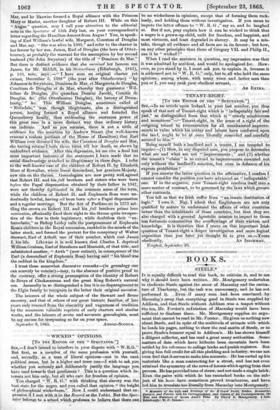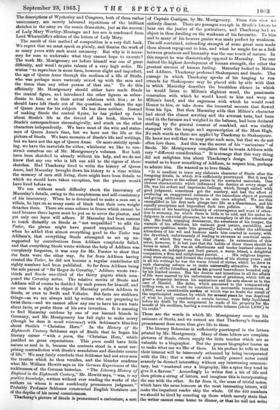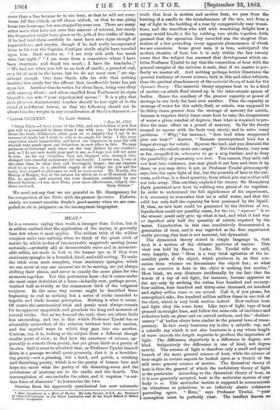IT is e q ually difficult t o re a d this book, to criticize
it, and to see why it should, have been written. Mr. Montgomery undertakes to vindicate Steele against,thessneer of Macaulay and the carica- ture of Thackera,y,,InttAseAaak was unnecessaryi and he has not perfoeuted it. yuiv !if ;many men had been convincedby Macaulay8 easay; that everything good ia Steele was supplied by Addison, and that Steele without Addison was a teapot without the tea, Mr. Forster's refutation of Macaulay would have been sufficient to disabuse then). Mr. Montgomery supplies no argu- ment that cannot be read in Mr. Forster. He gives us nothing new about Steele, and in spite of the multitude of extracts with which he loads his pages, nothing to show the real merits of Steele, or to prove Steele's humour equal to Addison's. He has shown himself a diligent collector, and has read a great many authorities. Some matters of date which have hitherto been uncertain have been settled by his reference to college books and parish registers. But giving him full credit for all this plodding and industry, we can not even find that it serves to make him accurate. He has carted up his materials like a man contracting for a street, and has not even attained the symmetry of the rows of houses which spring from that process. He has provided tons of straw, and not made a single brick. Even the pains with which he has ransacked books on the sub- ject of his hero have sometimes proved treacherous, and have led him to translate too literally from Macaulay into Montgomery.
* Memoirs of the Life and Writings of Sir N chard Steele, Soldier, Dramatist, Essayist, and Patriot, With his Correspowlence, and Notices of .his Contemporaries, the Wils and Statesmen of Queen Anne's Time, By Henry R. Montgomery. 2 vols. Edinburgh,: W. P. Nitomo.
The descriptions of Wycherley and Congreve, both of them rather unnecessary, are merely laboured repetitions of the brilliant sketches in the essay on the comic dramatists, just as the account of Lady Mary Wortley-Montagu and her son is condensed from Lord Wharncliffe's edition of the letters of Lady Mary.
The result of this method of composition is a very dull book. We regret that we must speak so plainly, and dismiss the work of so many years with such scant ceremony. But why is it neces- sary for men to undertake what they cannot hope. to execute? The work Mr. Montgomery set before himself was one of great difficulty, and would require talents of a very high order. He 'wishes "to reproduce in some form, however alight and imperfect, the age of Queen Anne through the medium of a life of Steele, who was perhaps more variously mixed up with the men and the times than any other person of that era." To do this efficiently Mr. Montgomery should either have made Steele the central figure, and introduced the other figures as subor- dinate to him, or in their actual relations with him ; or he should have left Steele out of the question, and taken the age of Queen Anne for his subject. He has done neither. Instead of making Steele the central figure, he has picked up facts about Steele's life as the thread of his book, thrown in Steele's correspondence chronologically, and stuck on the other characters independently. We have most of the wits and states- men of Queen Anne's time, but we have not the life or the picture of Steele. We have memoirs of Steele's life and writings, but we have not the age of Queen Anne. Or more strictly speak- ing, we have the materials for either, whichever we like to con- struct ourselves out of Mr. Montgomery's volumes. Bat both have been sketched in already without his help, and we do not know that any one who is left can add to the vigour of those sketches. Had Thackeray lived to write the history of Queen Anne, had Macaulay brought down his history to a time within the memory of men still living, there might have been details to which we should have taken exception, but the picture would have lived before us.
We can without much difficulty check the inaccuracy of Macaulay's details, owing to the completeness and self-consistency of his inaccuracy. When he is determined to make a man out a villain, he lays on so many coats of black that their own weight detaches them. There are some colours in fresco which cannot be used because three layers must be put on to cover the plaster, and yet only one layer will adhere. If Macaulay had been content to touch distantly on Steele as "not unqualified" to edit the Tatter, the phrase might have passed unquestioned. But when he added that almost everything good in the Tatter was Addison's, that everything Steele attempted to set up un- supported by contributions from Addison completely failed, and that everything Steele wrote without the help of Addison was completely forgotten, it was easy for Mr. Forster to show that the facts were the other way. So far from Addison having created the Tatter, he did not become a regular contributor till eighty numbers had been published. So far from Addison being the sole parent of "Sir Roger de Coverley," Addison wrote two- thirds and Steele one-third of the thirty papers which com- posed the Coverley series. The relative merits of Steele and Addison will of course be decided by each person for himself, and no man has a right to object if Macaulay prefers Addison to Steele, or even to Swift and Voltaire. But facts are stubborn things—as we are always told by writers who are preparing to twist them—and we cannot allow any one to have his own taste about facts, or prefer those of his own invention. ft is amusing to find Macaulay outdone by one of our learned friends in Germany, and Mr. Montgomery has full right to make merry (though he does it moult tristenzent) with Schlosser's blunders about Steele's "Christian Hero." In the History of the Eighteenth Century Schlosser says of Steele that he began his literary career "with a poem, the 'Christian Hero,' which justified no great expectations. This poem could have little nature or soul in it, because the contents stood in a most sur- prising contradiction with Steele's scandalous and dissolute course of life." We may fairly conclude that Schlosser had not even seen the treatise which he thus versifies, and the blunder confirms what Mr. William Howitt says in his German Experiences of the recklessness of the German historian. "The Literary History of England in the Eighteenth Century," Mr. Howitt says, "was, to my positive knowledge, written without ever reading the works of the authors on whom it most confidently pronounces judgment." Probably Professor Schlosser constructed English literature out of the depths of his moral consciousness.
Thackeray's picture of Steele is pronounced a caricature, a sort of Captain Coatigan, by Mr. Montgomery. From this view wa entirely dissent. There are passages enough in Steele's letters to bear out the justice of the portraiture, and Thackeray had an object in thus dwelling on the weakness of his favourite. To hins and to many of his hearers genius was made perfect by weakness. The self-contained, unbending strength of some great men made them almost repugnant to him, and what he sought for as a link between greatness and humanity was the one touch of nature. In this respect he was diametrically opposed to Macaulay. The one desired the highest development of human strength, the other the greatest amount of human feeling. Macaulay looked to Milton and Addison, Thackeray preferred Shakespeare and Steele. The passage in which Thackeray speaks of his longing to run errands for Shakespeare may be placed aide by side with that in which Macaulay describes the breathless silence in which he would listen to Milton's slightest word, the passionate veneration with which he would kneel to kiss and weep on Milton's hand, and the eagerness with which he would read Homer to him, or take down the immortal accents that flowed from his lips. But then Macaulay adds that Milton's character had stood the closest scrutiny and the severest tests, had been tried in the furnace and weighed in the balance, had been declared sterling by the general consent of mankind, and was visibly stamped with the image and superscription of the Most High. No such words as these are applied by Thackeray to Shakespeare. He knew too well that we may prize such men, but that we do not often love them. And this was the secret of his " caricature " of Steele. Mr. Montgomery complains that he treats Addison with very "different consideration." It is strange that this very thing did not enlighten him about Thackeray's design. Thackeray wanted us to know something of Addison, to respect him, perhaps to admire him. He wanted us to love Steele.
"It is needless to trace any elaborate character of Steele after the foregoing details, in which it is sufficiently pourtrayed. But it may be proper to glance at the salient points in the scattered materials. One obvious characteristic which influenced his destiny at every stage of life, was his ardent and impetuous feelings, which, though united with good judgment, sometimes got the mastery, and had the effect of producing an exaggerated estimate of the immediate object of pursuit and giving additional tenacity to an aim once adopted. We see this exemplified in his first rash plunge into life as a Guardsman, and his equally precipitate and imprudent dash into politics. . . With the exception of his besetting infirmity of extravagance and want of atten- tion to economy, for which there is little to be said, and his undue in- dulgence in convivial pleasures, he was exemplary in all the relations of life. His frank, engaging demeanour, the sweetness of his temper, the warmth of his affections, his eminent good nature, amiability, and generous qualities, made him generally beloved ; whilst the additional attractions of his wit and humour made him courted in society, with the drawback unfortunately of leading to excesses at convivial meet- ings, of which they were the chief charm. In extenuation of this error, however, it is but jut that the habits of those times should be borne in mind. He was an affectionate and tender husband almost to weakness, an indulgent and fond parent, a warm friend, a delightful companion, a firm and enlightened patriot. . . His religious impres- sions were strong, and formed the consolation of his closing years and in all his writings he was the warm friend of virtue, which he drew in such charming colours as to make universally attractive. He was a friend to all the friendless, and in his general benevolence bounded only by his limited means. Bt his desires and intentions in all the affairs of life were marred by his unfortunate want of prudence which left as great a disparity between his aspirations and his acts almost as in the case of Hamlet. His debts, which amounted to the comparatively trifling sum, as it would be considered in mercantile transactions, of 4,0004 and a considerable portion of which was no doubt the result of the unprincipled conduct by which for several years he was deprived of what he justly considered a certain income, were fully liquidated before his death by the assignment he made of his property for the benefit of his creditors, leaving a considerable balance (about 1,4000 to his credit."
These are the words in which Mr. Montgomery sums up Ida estimate of Steele, and we cannot see that Thackeray's dramatics presentment does more than give life to them.
The literary Bohemian is sufficiently pourtrayed in the letters printed by Mr. Montgomery. Many of these letters are complete pictures of Steele, others supply the little touches which are so valuable to a biographer. But the present biographer leaves us to make what use we like of them. In his preface he tells us that their interest will be immensely enhanced by being incorporated with the life ; that a mass of such hastily penned notes could scarcely be deemed interesting without any intervening commen- tary, but "scattered over a biography, like a spice they tend to give it a flavour." Accordingly he writes first a bit of life and then prints a string of letters, and imagines this is incorporating the one with the other. So far from it, the mass of trivial notes, which have the same honours as the most interesting letters, will make the impatient reader skip the whole. Of the 460 numbers we should be tired by counting up those which merely state that the writer cannot come home to dinner, or that he will not write more than a line because he is too busy, or that he will not come home till five o'clock, or till eleven o'clock, or that he was going home two hours ago, but was stopped by some one. There are many other notes that have not even this amount of interest, but surely the biographer might have given us the pith of five-sixths of them. If he had read them carefully he must have seen signs enough of improvidence and revelry, though if he had really incorporated these in his text the Captain Costigan simile might have recoiled upon him. Such entries RS, "1 am very sick with too much wine last night ;" "I am come from a committee where I have been chairman, and drank too much ; I have the headache ;" ." We had not when you left us an inch of candle, a pound of coal, or a bit of meat in the house, but we do not want now ;" are sig- nificant enough. One time Steele tells his wife that nothing troubles him sorely but the affront that insufferable brute has put upon her. Another time he writes for clean linen, being very dirty with running about ; and when expelled from Parliament he signs himself to his wife "your reprehended spouse." It is a pity that such pleasant characteristic touches should be lost sight of in the cloud of indifferent letters, or that the following should not be allowe 1 its due weight in any consideration of Steele's character LETTER CCCXXXV. To LADY Swam.
" June 21, 1717.
"DEAR Pau,—I have yours of the 17th, and am beholden to you that you will be persuaded to dress when I am with you. As for my share about the brats, Gillmore's affair goes on so happily that I am in no manner of doubt but I shall be able to do amply for them. I like your expression about immortality, and know our happiness in next life will depend very much upon our behaviour to each other in this. We may promote or interrupt each other on the way thither by our conduct ; and, as I do not now doubt your part to me, so I hope you will not mine to you. As for my vivaiities, they are changed into, changed into, changed into cheerful endeavours for my family. I never can, I own at the same time, be what they call thoroughly frugal ; but my expense shall be at home in a plentiful supply of all things for you and the brats, with regard to pleasures as well as necessaries. Mr. Madly, the Bishop of Bangor, has, in the sermon for which he is so ill-treated, done like an apostle, and asserted the true dominion established by our blessed Saviour.—I am, dear Prue, your most affectionate, obliged, obe- dient husband, Rica. Simms."
We need not say that we are grateful to Mr. Montgomery for his comparison of the Taller with the present Spectator. Unfortu- nately we cannot emulate Steele's good-nature when we are com- pelled to sit in judgment on his incompetent biographer.
































 Previous page
Previous page